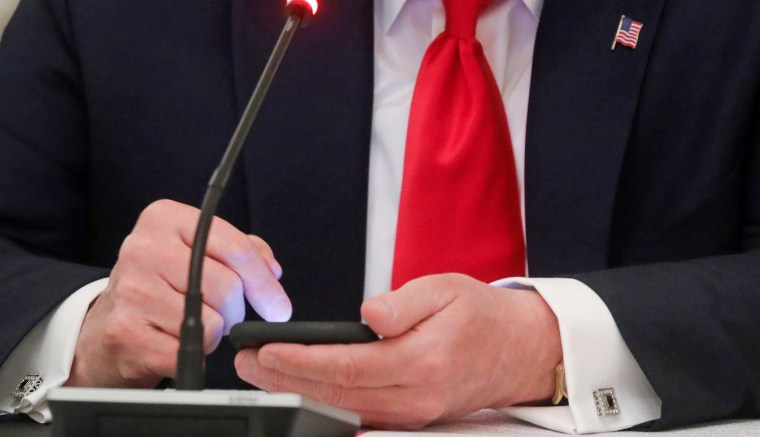When President Donald Trump's Facebook account Monday posted an evidence-free assertion that mail-in ballots "cannot be accurately counted," the social media giant responded, placing a label on the post that said simply: “Visit the Voting Information Center for election resources and official updates.”
That did not sit well with some of Facebook's critics.
“That label is worse than nothing,” Kate Starbird, a University of Washington associate professor of human-centered design and engineering, said in a tweet.
Facebook later changed the label to make it more aggressive, describing a “long history of trustworthiness” for both voting in person and by mail. A parallel scene played out with Twitter, where an identical claim from the president resulted in a short label: “Learn how voting by mail is safe and secure.”
But Facebook and Twitter still left the posts up.
Facebook and Twitter announced months ago that this is how they would deal with many posts from Trump about mail-in ballots: leave the posts up, but if they contained misleading information, add a fact-check label. And while the platforms in 2020 have new and aggressive policies about taking down misleading information, they have rarely removed Trump’s content.
The president has since taken full advantage, making the labels seem quaint in comparison.
“They’re not a magic fix to the president’s misinformation about elections,” Brendan Nyhan, a government professor at Dartmouth College, said.
Experts who study misinformation said the fact-check labels by Facebook and Twitter likely still have some value, especially if they’re made more prominent than they are now. Democrats are also ramping up the pressure.
But the labels also show how half-measures used by tech companies to try to fight harmful misinformation are bound to fall short of solving the problem.
The pattern has repeated for months and now seems destined to continue into November, leaving all sides somewhat dissatisfied with the outcome.
To Trump and his supporters, the labels are at turns an afterthought, a speed bump or a badge of honor from social media companies that want to deny him re-election by enforcing their rules. To Trump’s opponents and people who research false information online, the labels are a tool that’s inadequate for the weighty job of ensuring the integrity of the election.
Sometimes the labels are added only after a post has gotten many views, and it’s unclear if the labels affect the number of people who see the false information.
A Twitter spokesperson declined to answer questions about whether the company thinks the labels are working well, saying only that the labels offer context in line with its “civic integrity policy.”
Facebook also declined to say whether it thinks the labels are working well, but it said more than 39 million people had visited a Facebook website to get information on voting. It also said it was applying its rules impartially.
“We’ve faced criticism from Republicans for being biased against conservatives and Democrats for not taking more steps to restrict the exact same content,” Facebook spokesperson Andy Stone said in an email.
Mail-in ballots are popular in Republican and Democratic areas, and fraud involving mail-in ballots is exceedingly rare in part because of safeguards imposed by state and local officials to cross-check signatures and home addresses. Most states now provide ballot tracking.
But mail-in ballots may take longer to tally. In Pennsylvania, it took 28 days to count all the votes in the state’s June 2 primary.
Twitter first slapped a fact-check label on a Trump tweet in May in which the president alleged that mail-in ballots would be mostly fraudulent. (Three months later, Trump would request a mail-in ballot for the Florida primary election.)
Facebook in July announced a similar policy of labeling posts from elected officials and candidates, and a few days later it added a label to a Trump post.
Facebook CEO Mark Zuckerberg said in an update this month that the labels are intended to be informational when someone seeks to delegitimize voting methods — a different goal than, for example, deterrence.
“This label will provide basic authoritative information about the integrity of the election and voting methods,” Zuckerberg wrote in a Facebook post.
Suggestions abound for how Facebook, Twitter and other social media sites such as YouTube could add and improve their fact-check labels. They could use different color text or increase the size of the labels in relation to the posts themselves.
A couple social media posts from the Trump campaign last week, for example, had labels on Facebook and Twitter that were much smaller than a preview of a video from Donald Trump Jr.
“You really have to be paying attention to see them and process them,” said David Rand, an associate professor of management science and brain and cognitive sciences at the Massachusetts Institute of Technology.
“As long as you’re going to do it, you should do it in a more forceful way,” he said.
Rand said the bulk of the evidence suggests that online warnings and correctives are effective at informing people, and at making them less likely to share false information.
“It’s probably not going to make Trump less likely to post it, or Don Jr., but it might make regular people less likely to share it, which is maybe more important because that robs the content of its virality,” he said.
Dartmouth’s Nyhan said that Facebook’s fact-check labels have already become clearer and more aggressive since they were introduced years ago, when they told users only that a claim was “disputed.”
But, he said, opponents of the president might want to focus on fights other than social media labeling if they want to defeat him, because Trump will find other ways to get out his message and because tech companies already have a lot of power over speech.
“It is a democratic emergency that the president has refused to endorse a peaceful transition of power,” Nyhan said. “I don’t think we should be looking to giant corporations to address this problem as a first-order solution.”
